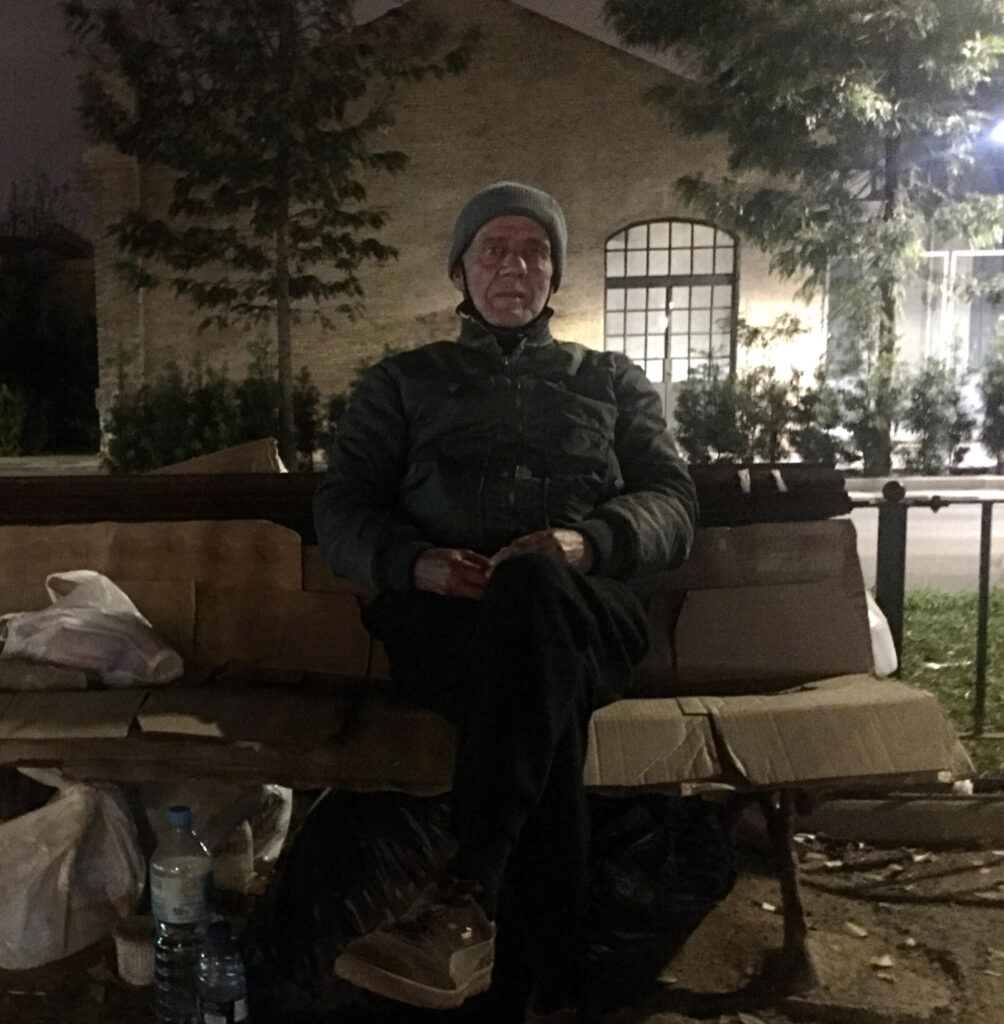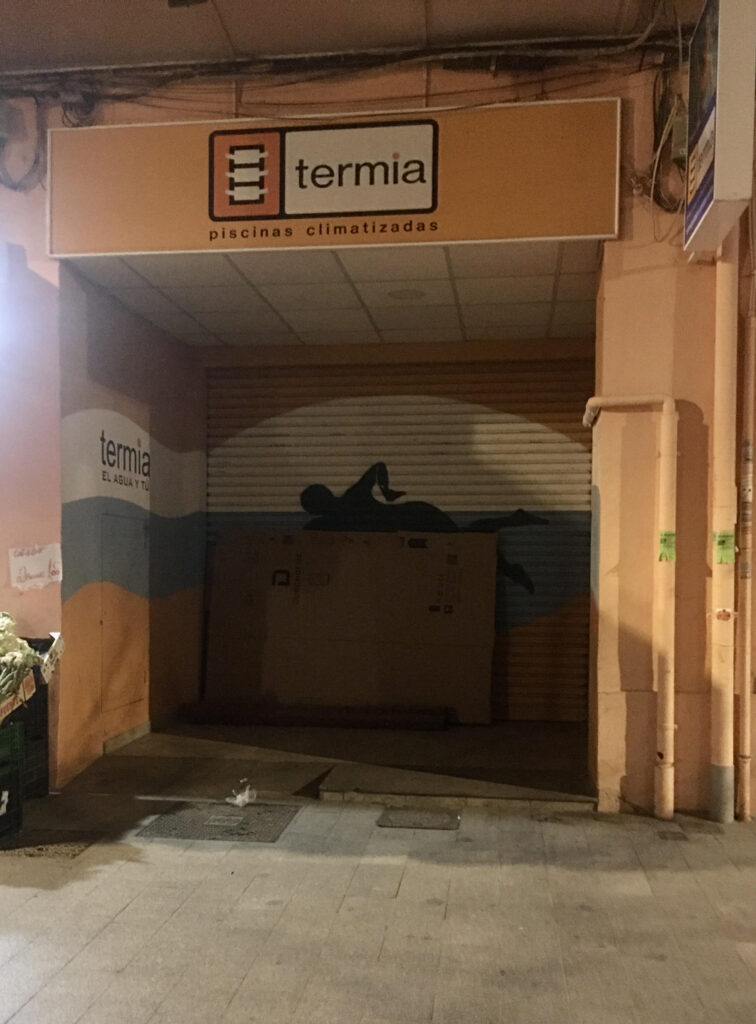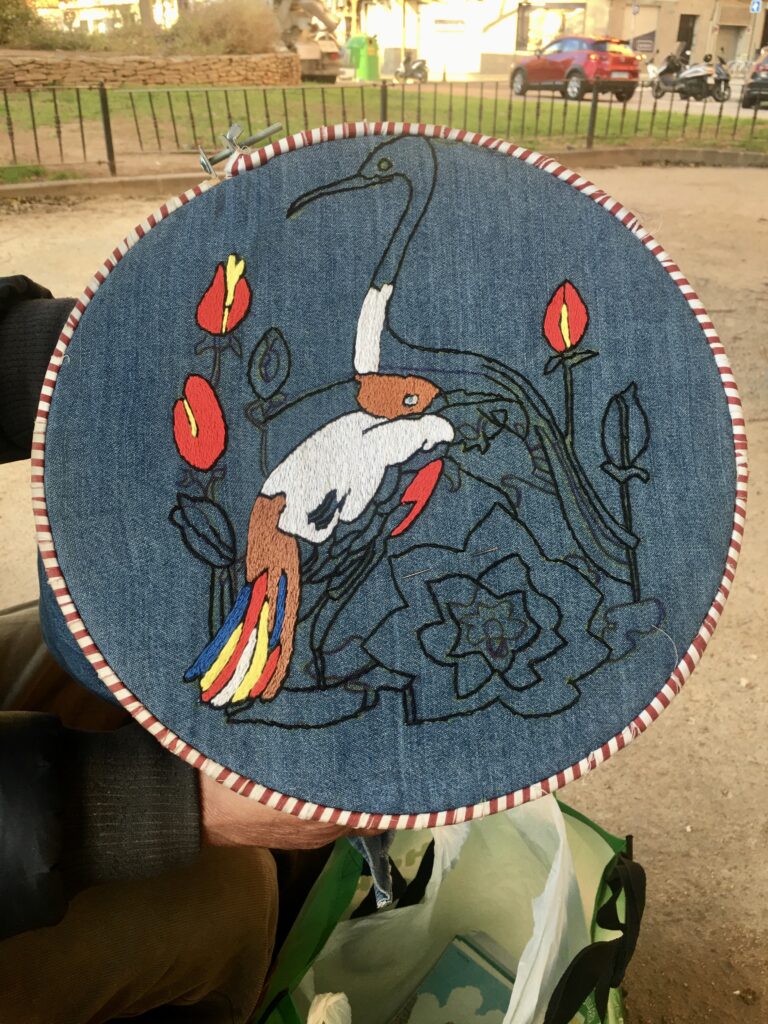(13-minute read time)

Up Close And Personal With El Canario
Ask any homeless person in Valencia who can talk to you about homelessness there, and there is no question – former specialist seamster from Gran Canaria, Miguel Angel. Stefano Reposi set off on a quest to meet him…
If I asked you how many of all the people you know have radically changed their habits because of the spread of coronavirus, the answer would be easy: everyone. Yes, there are some people who, although they have certainly been affected by the restrictions imposed by the government, nonetheless still preserve much the same way of life they had before the outbreak of the pandemic. As the sun is going down in Ruzafa, I walk into Calle Filipinas looking for a person who’s very well known in the neighborhood. His name is Miguel Angel, but everyone knows him as “El Canario”. I found him sitting on the same bench that, he says, has been his only home since 2016.
Miguel grew up in Gran Canaria in a whoppingly huge family with 18 brothers. While his father was working in the courthouse at the island’s capital Las Palmas, his mother, along with his aunt and the rest of the family, were making quality clothes that they resold either to department stores or to individual clients. They produced exclusively handmade clothing from their own home: “We didn’t even have a sewing machine,” he recalls. “The needle and our hands were the only tools we had.”
He started working with the family aged just 13, and by the age of 20, he had already become a specialist at the art of sewing and embroidering. That’s why as soon as he told his parents that he was going to leave Gran Canaria to follow the girl he fell in love with to Valencia, his father was peremptory: “If you go to Valencia, you will lose your family.”
Miguel, though, remained resolute in this decision to leave his family business in pursuit of a different life with the girl, with whom he would later become father to two children. “The fact is that my father did exactly the same thing I did. He was a clever man; he spoke five languages, including Latin because at the time he was studying to be a priest. But then he met my mother, fell in love with her and left his studies.”
When he first settled in Valencia, he lived along with his fiancée in a roomy apartment in Calle Sueca that she owned. He took a job as a mason, while he carried on sewing in his spare time. But just when things seemed to be going well for Miguel, his fiancée was diagnosed with cancer and died just a few months later. Although before her death she had insisted on Miguel living in the apartment for as long as he wanted, he decided to sell the house to his brother-in-law: “ I couldn’t go on seeing her from everywhere,” he says, sadly. “With the money I got I moved into a bunch of flats around Ruzafa. But when the Great Recession of 2008 struck, I lost all of my savings.”

“With the money I got I moved into a bunch of flats around Ruzafa. But when the Great Recession of 2008 struck, I lost all of my savings.”
– Miguel Angel, The king of the homeless of ruzafa
Since his arrival in the Eighties, his cheerful disposition helped him to forge a relationship with many people around the city, especially in Ruzafa, who were familiar with his personal story and the great deal of experience he had both as a tailor and also as a mason. Whenever they needed to remodel the bathroom, restore the kitchen or wanted to customise their own clothes with handmade embroidery and patches, they reached out to Miguel. Thereby he managed to rent a private room close to the Mercat de Russafa, where he spent the next five years before ending up on a bench in Calle Filipinas, the same one where he is sitting as he is talking to me now.
With the outbreak of coronavirus in March 2020, he spent the first two weeks in Calle Filipinas without a clue of the gravity of the situation: “I didn’t even know what was happening. People would tell me: Go home, you can’t stay here! The first few weeks, nobody would pick me up. Not the Red Cross, not anyone. I went without food for four days before my friend from social services gave me a call on the phone she had given me a few months before.” Within two days she went to pick him up and took him to La Barraca, a hostel right in front of Las Arenas beach where he stayed for about three weeks before being moved to the Ayuntamiento’s shelter house next to El Río – the Turia riverbed park – until lockdown was lifted at the end of May.
Miguel has been waiting almost two years to receive his pension for his last period of working as a mason: “It’s not a large amount of money, but it would be enough to get me off the street and to rent accommodation for a while.” According to him, the last digits of his bankbook rubbed off over time. It wasn’t till the beginning of January 2021 that a friend of his wrote a letter to the company he used to work for, explaining the situation Miguel was in and the bitter quality of life he was conducting, managing to ensure the amount due to Miguel for early March was signed off.
Meanwhile, with the curfew at 10pm enforced by the President of Comunidad Valenciana, Ximo Puig, El Canario found some shelter underneath the entrance of a swimming pool in the heart of Ruzafa, where he spends his nights in the hope of collecting his pension shortly. Despite the winter cold, he used to sleep on his bench in Calle Filipinas wrapped in cardboard, but with tree branches falling around him because of the strong wind and the rain he had to find a new shelter: “I also asked for a room at the Casa de Caridad but there was no space.”
Every Wednesday and every Saturday, around 7:30am, a local lady stops by with her car to give Miguel a warm meal and milk coffee, before heading to El Río and doing the same with the large number of homeless who find shelter in the shade of its trees. Miguel is able to get some food with the loose change he earns as valet for the rest of the week, even though he complains that since the arrival of the pandemic, the already meagre receipts have now turned into just a few cents each day, scarcely enough for a sandwich and a can of cheap beer.
If it were not for the two pieces of thin cardboard leaning on the bench next to him and a few plastic pouches placed under it, it would be hard to think about Miguel as one of the most well-known homeless people in Ruzafa. Even though he’s been living on the street for a number of years now, he is keen to look after his appearance, as attested by the grey stubble he steadily adjusts every week. “Sometimes I go jogging around Parque de la Cultura, I’m doing some stretching and other exercise to keep myself healthy. I do have to check on my stuff, though. Some homeless guy took my blanket several times. Others stole my clothes and food. Life on the street is hard “.
While the radio clenched on his knees is playing loud some forgotten Latin piece from the Nineties, a young lady steps forward holding a magazine on her hand. She shows the picture of a roaring tiger to El Canario, as she’s waiting for his opinion in order to know whether or not he could have embroidered it on the back of her denim jacket. Miguel approves it, and shows the image of the last project he’s been working on: a peacock patched on a jeans jacket. “Once I make the tail and the other missing parts colourful, it will be a great, unique piece,” he says enthusiastically, showing he has not lost his zest and optimism.
Whenever we talk about the art of sewing, his green eyes seem to sparkle in the dark and his mouth is like a river in flood. El Canario doesn’t seem to care about either how or when coronavirus restrictions will be lifted. Instead, he’s itching to collect his pension with which to be able to rent a small ground floor and a tiny workshop from which to carry on tailoring, and live the rest of his days with the dignity he proudly retains inside of him. But to do so, as he is keen to point out, he needs to enhance his existence by working:
“Work gives dignity to a man. I want to work, I get bored resting.”

With his 68th birthday coming up, the resilience shown by Miguel is the irrefutable evidence that is never too late to start the life of which we dream, and a valuable reminder of the attitude we should preserve as human beings to face the unforeseen adversities of life. It is a tribute to the invincibility of the human spirit.
Story by freelance journalist and writer, Eugene Costello, formerly based in east London and now living in Valencia, Spain. https://eugenecostello.co.uk/


Its pretty interesting that the mainstream media has changed the way it looks at this recently dont you think? Now it seems that it is discussed thoroughly and more in depth. Overall though Im looking for a change.